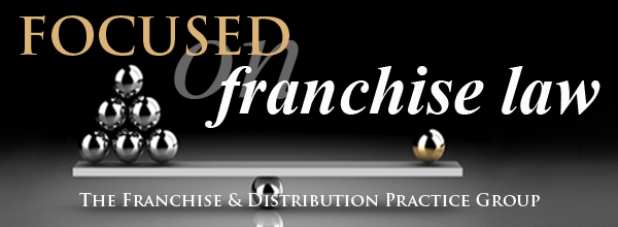Franchise 101: Liability as Certain as Death & Taxes; and To First Refuse, or Not to Refuse

bkurtz@lewitthackman.com
dgurnick@lewitthackman.com
tgrinblat@lewitthackman.com
swolf@lewitthackman.com
msoroky@lewitthackman.com
kwallman@lewitthackman.com
tvernon@lewitthackman.com
March 2018
FRANCHISOR 101:
Liability as Certain as Death & Taxes


Structuring a franchise to reduce risk of joint employment and vicarious liability means limiting a franchisor’s control over franchisees. This is a challenge in a professional services franchise, where the brand is intertwined with the franchisee’s personnel and the end product.
A California federal court held that a franchisee’s former customer sufficiently alleged claims that tax preparation franchisor Jackson Hewitt exercised sufficient control over processing of tax returns to be vicariously liable for fraudulent conduct of a franchisee’s rogue employee. The franchisor must also face claims of making fraudulent statements about accuracy of its tax preparation services.
The customer claimed the franchisee manipulated his tax returns to get a larger refund, and kept part of the refund as fees, without the customer’s knowledge. In a prior ruling, the Court found the franchisor’s controls were typical of a franchise relationship, and that control over certain aspects of a franchisee’s operations was insufficient to create vicarious liability. This time, the customer alleged that Jackson Hewitt controlled the instrumentality of the harm by hiring and training tax preparers, and reviewing, approving and submitting tax returns to the IRS through the franchisor’s proprietary and mandatory computer system. The Court was persuaded by allegations that the franchisor’s “Code of Conduct” referred to the reader as an “employee” of Jackson Hewitt (not of the specific franchisee), mandated background checks and training programs to prevent preparation of fraudulent returns, and set parameters for termination of franchisee employees for failure to comply with system requirements.
Jackson Hewitt was also alleged to have made fraudulent ads touting 100% accurate returns, comparison to mom and pop tax preparers, and the “Preparer’s Pledge” to handle a customer’s tax return like their own. The Court said the purpose of the ads was to engender trust in potential customers, so they would hire Jackson Hewitt and its franchisees to prepare their taxes.
A professional services franchisor should be cautious in preparing training materials and manuals to delineate no more supervision than needed over franchisee personnel, to protect the franchisor’s brand and intellectual property while trying to reduce the risk of vicarious liability for acts of a franchisee’s employees.
Read: Lomeli v. Jackson Hewitt, Inc.
FRANCHISEE 101:
To First Refuse, or Not to Refuse

A franchisee looking to transfer assets of a franchised business may be subject to the franchisor’s right of first refusal, the franchisor’s option to purchase the business, or both, depending on the language of a franchise or dealer agreement.
In a federal court in Pennsylvania, a franchisee of seven car dealerships prevailed against Audi of America, the franchisor of one of the dealerships. Audi claimed the franchisee breached Audi’s dealership agreement and violated state dealer law when, subject to the franchisor’s right of first refusal, the franchisee did not provide pricing and other terms to transfer an Audi dealership.
The dealership agreement and Pennsylvania dealer law granted Audi a right of first refusal if the franchisee attempted to sell its majority ownership interest in the Audi dealership. The franchisee found a buyer and entered into an asset purchase agreement which packaged all seven dealerships as an “auto multiplex” for $17 million. The agreement did not separately price the Audi dealership. Believing the franchisee was acting in bad faith in valuing the Audi dealership at $8 million, Audi sued to block the transaction. A court granted a preliminary injunction.
After Audi filed the lawsuit, the franchisee and buyer signed two addenda to the purchase agreement, seeking to remove the Audi dealership from the sale. The franchisee contended that Audi’s right of first refusal ended because it was no longer selling the Audi dealership. The trial court sided with the franchisee, finding there was no breach of the dealership agreement because the second addendum removed the Audi dealership, and the terms of the dealership agreement permitted the franchisee to withdraw the proposed sale after Audi elected its purchase right.
The Court also rejected Audi’s claim that the first refusal right ripened into an irrevocable option to buy the dealership. It was only a general right of first refusal, which Audi failed to exercise before the franchisee withdrew the Audi dealership.
While Audi claimed it was unable to exercise its right due lack of a good faith price breakdown, the dealer was free to withdraw the asset from the sale. Accordingly, the franchisor received the full benefit of its right of first refusal, and was not entitled to further rights after failing to accept the right of first refusal prior to the withdrawal.
Read: Audi of America, Inc. v. Bronsberg & Hughes Pontiac, Inc.
